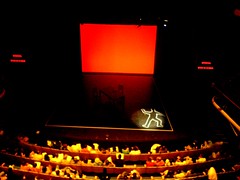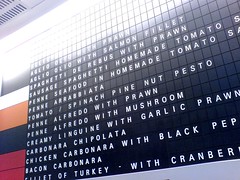The Arts and the Christian
Most people who've been living in Singapore for the past few months would not have been able to miss the excitement surrounding the inaugural Singapore Theatre Festival, yet another installment of WOMAD, the Singapore Biennale and perhaps even the upcoming ArtSingapore, da:ns Festival and Sotheby's biannual (not biennale!) auction of Southeast-Asian art.
Some artists are disillusioned with the art world, victims, perhaps, of bad experiences with critics who were convinced that interpretation of any piece of art is inherently subjective, that meaning is assigned not by the artist but by the viewer and so felt free to ascribe their own, sometimes diametrically opposite, meaning to their artwork. But for all their/our mistrust, there is something that still draws us to see the great masters and inspires us to sculpt and mould raw material with our hands; that reels us into listening to wonderful music; that makes us itch to feel the intimate tremble of a good violin under our chins; that incites us to bop to a mean bassline and admire a beautiful pas de deux; that hushes an entire theatre audience; that gives actors a stage high, feeding off the energy from a crowd that understands and enjoys our craft.
At the National Library Building branch of Hans, we were talking about the Christian's interaction with the arts. Assuming Rand Miller's (yes, the Myst guy) generalist definition of "art" as a "work (something produced through effort) created by a craftsman with the intent to communicate truth", what should the relationship between the arts and the Christian look like?
Should Christians be involved in and even enjoy art?
It could be possible, though I am not entirely sure about this, to see the creative process of doing art is part of our God-ordained creational nature: just as God created the universe out of nothing, so we reflect that creational nature by taking the raw materials that the Lord has created and moulding it into a work of art (or what we hope will have some aesthetic value (if that can be measured objectively)!). Just as God brought order to the chaos that was before this world, so we, on a much more human level, through art, bring some order to our fallen chaotic world (then again, so does the periodic table).
It is also possible that art reminds us of God's beauty: creative works that we find beautiful recall the beauty of God's creative power and cause us to reflect on the glory of God. In fact, we also marvel at the goodness of God for putting in us the ability to appreciate and even find enjoyment in literature, poetry, painting, sculpture and dance.
However, the eagerness to avoid the charge of idolatry has made many Christians suspicious of art. Ever since icons and statues in churches were destroyed in the name of God during the Reformation, Protestants have had an uneasy relationship with the visual arts. There is no space here for discussion of those iconoclastic practices but the warnings against the making of idols from Leviticus and Deuteronomy onwards seemed to be less a complete ban on drawing, painting or sculpture per se, for elsewhere within Scripture, such creative work was expressly instructed by God in relation to the building of physical tabernacles or temples. God also tells his people to sing, dance, and play instruments as ways of expressing their relationship with him. Rather, the warning was against idolatry, specifically expressed in such forms.
In Exodus 31, God tells Moses that he has given a chap named Bezalel the Spirit of God, with ability and intelligence, with knowledge and all craftsmanship, to devise artistic designs, to work in gold, silver and bronze, in cutting stones for setting and in carving wood, for work in every craft. If God is the creator of the entire universe, then all craftsmanship and artistic ability is a gift of God just as our lifebreath is.
However, we live in a fallen world as sinful beings, and we must be aware that there are proper and improper ways of exercising our God-given gifts; we must remember that the terrible incident of the Golden Calf came far too soon after God gifted workmen for the building of his tabernacle.
Some emerging church leaders claim that they, being far more enlightened than the Reformers ever were, will work to reverse centuries senseless repression of talent by the Reformers by encouraging Christian artists to fill the walls of church buildings with their works and promoting the performance arts.
But it is profoundly atheistic to encourage art for arts' sake. A Christian knows that all art, and indeed everything in life, must be done for God's sake, for that is the purpose of all creation. "Whatever you do, do all to the glory of God," says Paul in 1 Corinthians 10:31. And there is no such thing as a solitary Christian, for when a Christian is saved, he is welcomed into a community, a church, the body of Christ. Therefore, all creative work, and in fact, all things must also be done for edification and building up of the body (1 Corinthians 14:26 in the specific context of communal worship). All that a member of the body does must be done in love for the whole.
In any case, it is virtually impossible to be part of a community and not be confronted by the art of that culture. A Christian must not ignore secular culture but think and evaluate it according to God's word.
What should a Christian's artwork look like?
Does this mean that all Christian artistic endeavour must necessarily be evangelistic or pietistic?
Heavens! No, if that means kitschy figurines, plastic flowers and gaudy (not Gaudí, although some would think Gaudí as gaudy) depictions of Bible stories!
Inevitable Evangelism I
Yet, behind every work of art a worldview, is a commitment to either the truth or to a lie. Every art piece, every performance represents the inner thoughts and beliefs of the artist, and it either breathes a spirit of commitment to the true God revealed in the Scriptures, or attests an allegiance to an idol. In any artwork, the Christian inevitably presents his uniquely counterculturally Christian interpretation of the world.
Inevitable Evangelism II
Besides, as Christians, that which underlies our interest and involvement in the arts is not, after all, secular. Neither is that which underlies our interest and involvement in anything else in our lives (our work, our hobbies, our family or friends). As God's people, we are committed to using our lives to work for the redemption of all things in Christ. So we are purposeful in our involvements.
Egads, one might say. That's all a bit utilitarian innit?
But we remember that there will come a time when Christ will return to judge the world and he will punish those who do not know the true and living God or trust in the gospel of his Son (2 Thessalonians 1:6-10). Says C.S. Lewis:
Importance of the Arts in Evangelism
Powerful Evangelism
The arts are potentially powerful vehicles for influencing entire cultures for good or for evil. There is something about the arts that reach out and break through to the hearts and minds of some people who might otherwise be unmoved, and that is where skilled Christian artists ought to be speaking the truth about the ultimate reality.
Dispensible Method of Evangelism
Yet, we know that in his sovereignty, God will work in any way that he wishes. Ultimately, it is not our skills in our chosen field of art that must be cultivated and nurtured but our passion for the lost, knowing that those whom we encounter are not mere mortals but will be immortal. And unless they repent and turn back to God, that immortality will be lived out in eternal hell and the terrible gnashing of teeth.
So C.S. Lewis makes the point about his own specialisation:
Some artists are disillusioned with the art world, victims, perhaps, of bad experiences with critics who were convinced that interpretation of any piece of art is inherently subjective, that meaning is assigned not by the artist but by the viewer and so felt free to ascribe their own, sometimes diametrically opposite, meaning to their artwork. But for all their/our mistrust, there is something that still draws us to see the great masters and inspires us to sculpt and mould raw material with our hands; that reels us into listening to wonderful music; that makes us itch to feel the intimate tremble of a good violin under our chins; that incites us to bop to a mean bassline and admire a beautiful pas de deux; that hushes an entire theatre audience; that gives actors a stage high, feeding off the energy from a crowd that understands and enjoys our craft.
At the National Library Building branch of Hans, we were talking about the Christian's interaction with the arts. Assuming Rand Miller's (yes, the Myst guy) generalist definition of "art" as a "work (something produced through effort) created by a craftsman with the intent to communicate truth", what should the relationship between the arts and the Christian look like?
Should Christians be involved in and even enjoy art?
It could be possible, though I am not entirely sure about this, to see the creative process of doing art is part of our God-ordained creational nature: just as God created the universe out of nothing, so we reflect that creational nature by taking the raw materials that the Lord has created and moulding it into a work of art (or what we hope will have some aesthetic value (if that can be measured objectively)!). Just as God brought order to the chaos that was before this world, so we, on a much more human level, through art, bring some order to our fallen chaotic world (then again, so does the periodic table).
It is also possible that art reminds us of God's beauty: creative works that we find beautiful recall the beauty of God's creative power and cause us to reflect on the glory of God. In fact, we also marvel at the goodness of God for putting in us the ability to appreciate and even find enjoyment in literature, poetry, painting, sculpture and dance.
However, the eagerness to avoid the charge of idolatry has made many Christians suspicious of art. Ever since icons and statues in churches were destroyed in the name of God during the Reformation, Protestants have had an uneasy relationship with the visual arts. There is no space here for discussion of those iconoclastic practices but the warnings against the making of idols from Leviticus and Deuteronomy onwards seemed to be less a complete ban on drawing, painting or sculpture per se, for elsewhere within Scripture, such creative work was expressly instructed by God in relation to the building of physical tabernacles or temples. God also tells his people to sing, dance, and play instruments as ways of expressing their relationship with him. Rather, the warning was against idolatry, specifically expressed in such forms.
In Exodus 31, God tells Moses that he has given a chap named Bezalel the Spirit of God, with ability and intelligence, with knowledge and all craftsmanship, to devise artistic designs, to work in gold, silver and bronze, in cutting stones for setting and in carving wood, for work in every craft. If God is the creator of the entire universe, then all craftsmanship and artistic ability is a gift of God just as our lifebreath is.
However, we live in a fallen world as sinful beings, and we must be aware that there are proper and improper ways of exercising our God-given gifts; we must remember that the terrible incident of the Golden Calf came far too soon after God gifted workmen for the building of his tabernacle.
Some emerging church leaders claim that they, being far more enlightened than the Reformers ever were, will work to reverse centuries senseless repression of talent by the Reformers by encouraging Christian artists to fill the walls of church buildings with their works and promoting the performance arts.
But it is profoundly atheistic to encourage art for arts' sake. A Christian knows that all art, and indeed everything in life, must be done for God's sake, for that is the purpose of all creation. "Whatever you do, do all to the glory of God," says Paul in 1 Corinthians 10:31. And there is no such thing as a solitary Christian, for when a Christian is saved, he is welcomed into a community, a church, the body of Christ. Therefore, all creative work, and in fact, all things must also be done for edification and building up of the body (1 Corinthians 14:26 in the specific context of communal worship). All that a member of the body does must be done in love for the whole.
In any case, it is virtually impossible to be part of a community and not be confronted by the art of that culture. A Christian must not ignore secular culture but think and evaluate it according to God's word.
What should a Christian's artwork look like?
Does this mean that all Christian artistic endeavour must necessarily be evangelistic or pietistic?
Heavens! No, if that means kitschy figurines, plastic flowers and gaudy (not Gaudí, although some would think Gaudí as gaudy) depictions of Bible stories!
Inevitable Evangelism I
Yet, behind every work of art a worldview, is a commitment to either the truth or to a lie. Every art piece, every performance represents the inner thoughts and beliefs of the artist, and it either breathes a spirit of commitment to the true God revealed in the Scriptures, or attests an allegiance to an idol. In any artwork, the Christian inevitably presents his uniquely counterculturally Christian interpretation of the world.
Inevitable Evangelism II
Besides, as Christians, that which underlies our interest and involvement in the arts is not, after all, secular. Neither is that which underlies our interest and involvement in anything else in our lives (our work, our hobbies, our family or friends). As God's people, we are committed to using our lives to work for the redemption of all things in Christ. So we are purposeful in our involvements.
Egads, one might say. That's all a bit utilitarian innit?
But we remember that there will come a time when Christ will return to judge the world and he will punish those who do not know the true and living God or trust in the gospel of his Son (2 Thessalonians 1:6-10). Says C.S. Lewis:
It is hardly possible for [us] to think too often or too deeply about [the glory] of our neighbour. . . It is a serious thing to live in a society of possible gods and goddesses, to remember that the dullest and most uninteresting person you talk to may one day be a creature which, if you saw it now, you would be strongly tempted to worship, or else a horror and a corruption such as you now meet, if at all, only in a nightmare. All day long we are, in some degree, helping each other to one or other of these destinations. It is in the light of these overwhelming possibilities, it is with the awe and the circumspection proper to them, that we should conduct all our dealings with one another, all friendships, all loves, all play, all politics. There are no ordinary people. You have never talked to a mere mortal. Nations, cultures, arts, civilization — these are mortal, and their life is to ours as the life of a gnat. But it is immortals whom we joke with, work with, marry, snub, and exploit — immortal horrors or everlasting splendours. ("The Weight of Glory")When we think about those who will encounter our works, the audiences at our performances, we must keep before our eyes the fate of those who are perishing; the eternal destinations of unsaved sinners.
Importance of the Arts in Evangelism
Powerful Evangelism
The arts are potentially powerful vehicles for influencing entire cultures for good or for evil. There is something about the arts that reach out and break through to the hearts and minds of some people who might otherwise be unmoved, and that is where skilled Christian artists ought to be speaking the truth about the ultimate reality.
Dispensible Method of Evangelism
Yet, we know that in his sovereignty, God will work in any way that he wishes. Ultimately, it is not our skills in our chosen field of art that must be cultivated and nurtured but our passion for the lost, knowing that those whom we encounter are not mere mortals but will be immortal. And unless they repent and turn back to God, that immortality will be lived out in eternal hell and the terrible gnashing of teeth.
So C.S. Lewis makes the point about his own specialisation:
The Christian will take literature a little less seriously than the cultured Pagan...The Christian knows from the outset that the salvation of a single soul is more important than the production or preservation of all the epics and tragedies in the world. ("Christian Reflections")
Labels: Art/Architecture/Design, Friendship and mateship, Jubal's Legacy: Violin, Theatre and Plays













1 Comments:
It is a good point that you raise Shadow, and may be we need more discussions of this sort. My friend K!mberly keeps a blog on similar issues which I invite you to visit! She also contributes to CreateLeVoyage to empower and network Christians in the Arts in Singapore which may also interest you.
Post a Comment
Subscribe to Post Comments [Atom]
<< Home